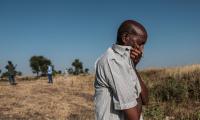Independent watchdog of human rights is emerging in Ethiopia

600 people were killed in a massacre in Makaidra in Tigray, Ethiopia in November 2020. Photo: Eduardo Soteras/AFP/Ritzau/Scanpix
Since it was established the Ethiopian Human Rights Commission was perceived as not acting free of government interference.
“The Ethiopian Human Rights Commission was just a body that was justifying the brutality of government forces,” Executive director of the Center for Advancement of Rights and Democracy, Befeqadu Z. Hailu claims.
Editor in chief of the Ethiopian newspaper, Ethiopia Insider, Tesfalem Waldyes, agrees.
“When they even investigated the abuses, they always blamed the protesters or the victims, rather than the government forces.”
Calling out cases of human rights violations
In recent years, however, the Ethiopian government’s political reforms paved the way for concrete steps towards improving the protection of human rights. This includes the appointment of an independent human rights advocate to lead the national human rights institution of Africa's second-most populous nation and a crucial amendment to the establishing law to broaden its mandate and ensure its independence.
As a result, the Commission now regularly publishes statements calling out cases of human rights violations. It also carries out investigations and publishes reports on serious human rights violations that are taking place as Ethiopia grapples with ethnic and political unrest.
“The human rights development Ethiopia is concerning and we see alarming and grave violations in very large numbers. The Commission and other human rights advocates are struggling to bring justice to the victims and to hold the government and other perpetrators accountable. This is crucial if Ethiopia seriously wish to move towards a democracy governed by rule of law and observance of our human rights obligations,” Chief commissioner, Ethiopian Human Rights Commission Daniel Bekele says.
Since 2019 The Danish Institute for Human Rights has supported the Ethiopian Human Rights Commission (EHRC), headed by Chief Commissioner Dr. Daniel Bekele, to gain independence and capacity. The partnership is funded by the Government of Denmark. Read more.
Holding the government accountable
After investigating the unrest and gruesome killings that followed the assassination of the Ethiopian musician Hachalu Hundessa in June 2020, the Commission published a report that documented abuses at the hands of security forces.
According to the investigation that was carried out in 40 localities across Ethiopia, at least 76 people were killed by security forces whose excessive force also left 190 injured. The report also
questioned the proportionality of the security forces employed in the localities.
"While it is understandable that security forces had the challenging task of restoring order in the face of such widespread violence, the proportionality of the force employed in some contexts is highly questionable," the report said. Link to the report.
In December 2020 the Commission released another crucial report on the massacre of more than 600 civilians in the town of Mai Kadra in Tigray region. Its probe found that the atrocities may constitute crimes against humanity and war crimes, and the Commission called for the perpetrators to be held to account.
“The investigative reports are some of several examples of leadership by Ethiopia's national human rights institution and the enhanced ability to fulfil their mandate. This also illustrates what key role a NHRI can and must play in promoting respect for the rule of law and protection of human rights, provided the NHRI has the capacity and a strong mandate free from government interference,” International Director, Danish Institute for Human Rights, Eva Grambye says.
Independently appointed commissioners
Another crucial result of the amendment of the founding law of the Commission is the politically independent nomination and appointment of commissioners on merit. For the first time in its history, Ethiopia’s Parliament will soon appoint commissioners for key thematic areas, including women’s rights, child rights and disability rights, following a transparent process which also involves the direct participation of civil society organizations.
Previously the process of nominating commissioners was vulnerable to political influence. Some commissioners were members of political parties, which compromised the credibility of the institution. The provisions of the former law also failed to ensure autonomy that would prevent direct or indirect influence on the administration of the Commission’s budget.
The new law further empowers the Commission to inspect prisons and detention places as well as public service institutions without any prior notice.
National human rights institutions are key in documenting human rights abuses and ensuring accountability. National institutions are established by law by the parliament in about 110 countries. They have a unique position in the state, as they are state institutions but function independently of the government. A set of criteria are developed to make sure each national institution is fully independent. Read more.
